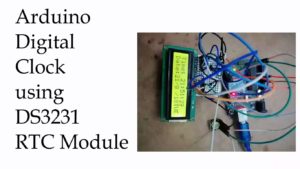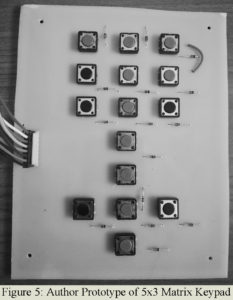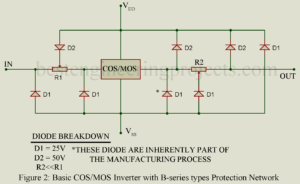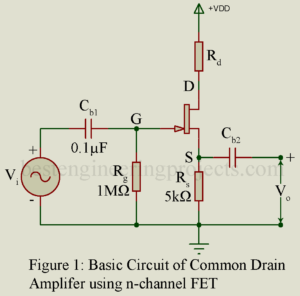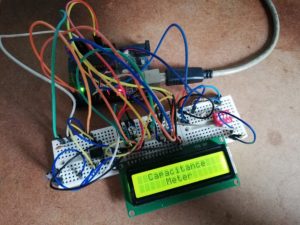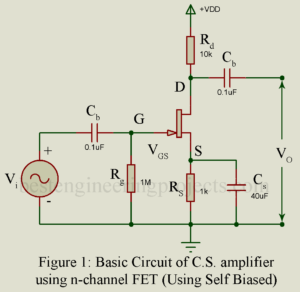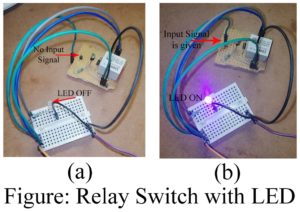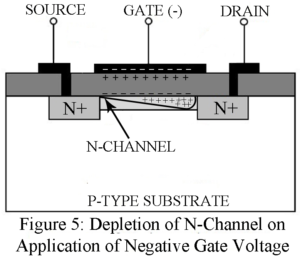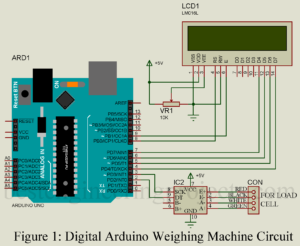A bipolar junction transistor (BJT) forms an extension of a PN diode. It is three-layer semiconductor device with two junctions. Further it is a bipolar device i.e. the current is carried by two types of charge carriers namely electrons and holes and hence the device is called a Bipolar Junction Transistors. A BJT is basically used as an amplifier i.e. as a circuit for amplifying or increasing the magnitude of a periodic or an a-periodic voltage or current. A junction transistor may be of PNP type or NPN type and…
Read MoreArduino Digital Clock using DS3231 Pi Module
We are getting about how to make the digital clocks more accurate and precise even at varying parameters like temperature and humidity. Generally, in the market, if we go for buying the RTC module we will find the DS1307 module more simply. As DS1307 module is more prone to external temperature variation because it uses an external crystal oscillator circuit as a result the accuracy of the timekeeping changes. While designing a LED board for my college kec.edu.np, I suffered from a time accuracy problem. After a few days, time…
Read MoreDIY 5×3 matrix keypad for arduino
In this tutorial we are going to design a customized DIY 5×3 matrix keypad for arduino using tactile switch and small signal diode 1N4148. Many microcomputer/ Arduino system designs require some type of a keypad as an input device. Some time we required customized key for our own project rather then conventional available matrix keypad (4×4 or 4×3) in market. What if we require the key for other operation like left, right, up, down and ok operation. The outlook of the project may not be sophisticated if we had used…
Read MoreGeneral Operation and Application Consideration for COS/MOS ICs
This article is intended as a guide to circuit and equipment designers in the operation and application of MOS integrated circuits. It covers general operating and handling considerations with respect to the following critical factors: Operating supply-voltage range Power dissipation and derating System noise considerations Power-source rules Gate-oxide protection networks Input signals and ratings Chip assembly and storage Device mounting Testing More specific information is then given on significant features, special design and application requirements, and standard ratings and electrical characteristics for COS/MOS A- and B- series logic circuits, and…
Read MoreCommon Drain Amplifier using FET
Common Drain Amplifier Introduction In the common drain amplifier, the input signal is applied between the gate and drain and the amplified output voltage is developed across a resistor in the source-to-drain circuit. The drain is the terminal common to the input and the output sides. Figure 1 gives the circuit of one stage of a common drain amplifier (CD) using n-channel FET. Rs is the load impedance placed in the source circuit. Quite often a resistor Rd is placed in the drain circuit to further stabilize the operation of…
Read MoreArduino Capacitance Meter Project
In this project you will learn how to make your own arduino capacitance meter (measure the value of capacitor from the range of pF to 1000’s uF). Generally, electronic hobbyist love to design their own gadget rather than buy. In this project we are using two approach for capacitance measurement i.e. charging and discharging approach arduino capacitance meter and multivibrator approach arduino capacitance meter. For measuring low value capacitor, we are using charging and discharging approach and for measuring high value capacitor we are using multivibrator approach. So, before starting…
Read MoreCommon Source Amplifier using FET
Common Source Amplifier In this amplifier, input signal is applied between gate and source and the amplified output voltage is developed across a load resistor in the drain circuit. Thus, source is the common terminal between the input side and the output side. Figure 1 gives the circuit of one stage of common source amplifier (CS) Amplifier using n-channel FET and with biasing arrangement. The typical component values are also shown in figure. This circuit is analogous to common emitter amplifier. On using p-channel FET, polarity of supply voltage is…
Read MoreHow to Make Relay Switch Circuit
In this tutorial, you will learn how to make your relay switch circuit for Arduino in a few easy steps. We often see many electronics hobbyists especially Arduino users buy expensive relay modules instead of building their own. The general price of the relay module found in the market is about $2 but you can make your own for less than $0.70. In the tutorial Relay Switch circuit for Arduino, you will learn Relay and Operating principle Pin Identification of Relay Component value calculation and choosing the best for your…
Read MoreMOSFET | Types of MOSFET | Circuit Symbol
Metal Oxide Semiconductor FET (MOSFET) MOSFET is of greater commercial importance than the junction FET. Types of MOSFET Enhancement MOSFETs and Depletion MOSFETs. Enhancement Type MOSFET Figure 1 gives the cross-sectional view of a p-channel enhancement MOSFET. It consists of a lightly doped n-type substrate into which all diffused two highly dipped p + region spaced 10 to 20um apart. One region, say the left-hand region, acts as the source while the other region acts as the drain. A thin insulating layer of SiO2 of thickness 1000 to 2000 A…
Read MoreArduino Weighing Machine using HX711
How to interface Load Cell with Arduino? How to make your very own Arduino Weighing Machine? Today, in this article you will learn about interfacing of Load Cell with Arduino and finally make your own Arduino Weighing Machine. This project is designed to weigh up to 50 Kg (depending upon the load cell you are using) accurately and efficiently. Components Required for Arduino Weighing Machine Arduino UNO Board x 1 16×2 Alphanumeric LCD x 1 Load Cell x 1 HX711 Module x 1 10K variable Resistor x 1 4.7K Resistor…
Read More
